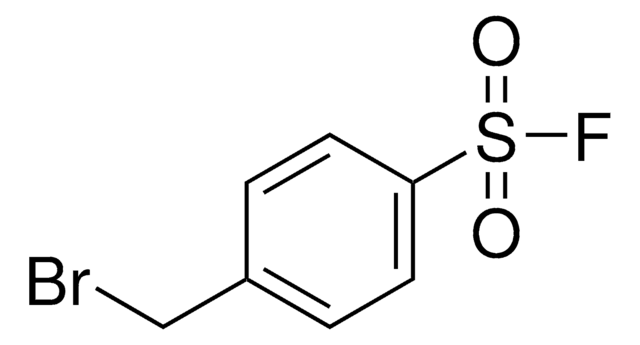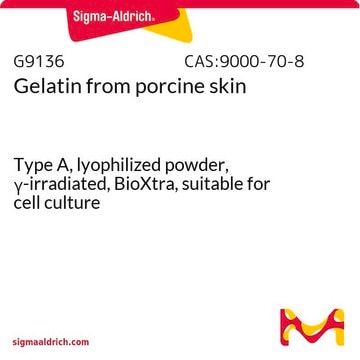About This Item
Código UNSPSC:
12161503
eCl@ss:
32161000
NACRES:
NA.76
Produtos recomendados
Aplicação
The EMD Millipore QCM Gelatin Invadopodia Assay (Red) provides the reagents necessary for affixing a thin, uniform layer of Cy3-labeled gelatin to a glass culture substrate, allowing for rapid detection of matrix degradation (Artym et al., 2009, Xu et al., 2009). A poly-L-lysine coating is first adsorbed to the glass substratum. The substrate is then treated with a dilute glutaraldehyde solution to bi-functionally “activate” the surface for further protein binding. Subsequent incubation of the surface with fluorescent gelatin allows covalent coupling between the poly-L-lysine and gelatin via reactive aldehyde (-CHO) groups. The fluorescently-coated glass is now prepared for cell culture by disinfection with 70% ethanol, followed by quenching of free aldehydes with amino acid-containing growth medium. Upon completion of fluorescent substrate preparation, cell types of interest may be seeded onto the gelatin surface for a desired amount of time. Depending on cell type, degradation may occur within a few to several hours. Treatment compounds of interest may also be introduced within the culture period.
With EMD Millipore′s QCM Gelatin Invadopodia Assay (Red), degraded areas of gelatin, now devoid of fluorescence, may be microscopically visualized and quantified using image analysis software algorithms. The assay also provides fluorescent FITC-phalloidin and DAPI, for visualization of cytoskeletal F-actin and nuclei, respectively, to allow co-localization of degradation with cellular features. Potential activators or inhibitors of invadopodia formation may be investigated for their influence on the degree and frequency of matrix degradation, and the assay may be further combined with immunocytochemical staining for other molecules of interest in pathway studies.
With EMD Millipore′s QCM Gelatin Invadopodia Assay (Red), degraded areas of gelatin, now devoid of fluorescence, may be microscopically visualized and quantified using image analysis software algorithms. The assay also provides fluorescent FITC-phalloidin and DAPI, for visualization of cytoskeletal F-actin and nuclei, respectively, to allow co-localization of degradation with cellular features. Potential activators or inhibitors of invadopodia formation may be investigated for their influence on the degree and frequency of matrix degradation, and the assay may be further combined with immunocytochemical staining for other molecules of interest in pathway studies.
Embalagem
Enough Reagents for 4 x 8-well Chamber Slides (32 assays)
Componentes
Cy3™-Gelatin, 4X: One vial containing 0.5 mL Unlabeled Gelatin, 4X: One vial containing 2 mL DAPI: One vial containing 100 µL at 100 µg/mL in water Poly-L-Lysine, 2X: One vial containing 5 mL Glutaraldehyde, 16X: One vial containing 1 mL FITC-Phalloidin: One vial containing 20 µg
Armazenamento e estabilidade
Store Cy3™-Gelatin, Unlabeled Gelatin, Poly-L-Lysine and DAPI at 2-8°C. Store Glutaraldehyde and FITC-Phalloidin at -20°C. Use all reagents within 4 months from date of receipt.
Informações legais
Cy3 is a trademark of Cytiva
Exoneração de responsabilidade
Unless otherwise stated in our catalog or other company documentation accompanying the product(s), our products are intended for research use only and are not to be used for any other purpose, which includes but is not limited to, unauthorized commercial uses, in vitro diagnostic uses, ex vivo or in vivo therapeutic uses or any type of consumption or application to humans or animals.
Palavra indicadora
Danger
Frases de perigo
Declarações de precaução
Classificações de perigo
Acute Tox. 2 Oral - Acute Tox. 4 Inhalation - Aquatic Chronic 2 - Eye Dam. 1 - Resp. Sens. 1 - Skin Corr. 1B - Skin Sens. 1 - STOT SE 3
Órgãos-alvo
Respiratory system
Perigos de suplementos
Código de classe de armazenamento
6.1A - Combustible acute toxic Cat. 1 and 2 / very toxic hazardous materials
Certificados de análise (COA)
Busque Certificados de análise (COA) digitando o Número do Lote do produto. Os números de lote e remessa podem ser encontrados no rótulo de um produto após a palavra “Lot” ou “Batch”.
Já possui este produto?
Encontre a documentação dos produtos que você adquiriu recentemente na biblioteca de documentos.
Nossa equipe de cientistas tem experiência em todas as áreas de pesquisa, incluindo Life Sciences, ciência de materiais, síntese química, cromatografia, química analítica e muitas outras.
Entre em contato com a assistência técnica











